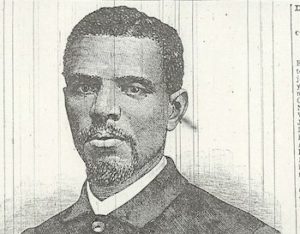
William Heard
*William H. Heard was born on this date in 1850. He was a Black clergyman and politician. William Henry (Harrison) Heard was born a slave in Elbert County, Georgia, some three miles from the small settlement of Longstreet. His father, George, was a blacksmith and later a wheelwright and carpenter of mixed ethnicity.
George was the son of an unknown mother and, reputedly, a white man named Thomas Heard, son of Stephen Heard. William Heard's mother was Pathenia Galloway. She was a farmhand skilled in plowing, but her owners also valued her as a "breeder" (a woman who regularly produced children), so she was allowed to work close to her cabin to nurse her children frequently. Because of slavery, Heard's parents could not enter into a legally recognized marriage. Also, as they belonged to separate estates, some three miles apart, they could not live together. Still, his owners permitted his father to visit his family twice a week when his labor was not required (overnight, on Wednesday and Thursday, and Sunday).
With his mother and three siblings, Millie, Beverley, and Cordelia, Heard was sold twice as a child. When he was nine and already working as a servant in the household where his mother was a cook, she and his elder sister died of typhoid fever. At age ten, Heard was set to work as a plowboy on a farm. At fifteen, having been assaulted by a drunken "boss man" and becoming aware of the potential ending of his slave status after the American Civil War, he fled and began living with his father, who kept a wheelwright's shop in Elberton, Georgia. Although literacy was forbidden to slaves before the War, he attended Sunday School and trained his memory by learning large amounts of the Bible by memory.
After emancipation, while living with his father, he paid a white schoolboy ten cents a lesson to teach him basic literacy. He also began working for a local farmer for five dollars a month, and each night, he had the opportunity to recite back to him a lesson learned over lunch. This farmer was William H. Heard, from whom Heard then took his name (he had previously been known as "Henry"). Heard returned and began working at his father's shop. By this time, a school had been set up in Elberton that he could attend. By seizing every opportunity for educational advancement, he earned a teaching qualification and secured a place at the university.
He attended the University of South Carolina until 1877, when the state government removed all Black students. During the Reconstruction era, Heard was elected to the South Carolina state legislature as a Republican from Abbeville County but was removed when the Democrats regained power. Due to his political interests, he was unable to secure a teaching position in the state. He later completed his education in Philadelphia. In 1878, Heard, whose parents had followed Baptist and Methodist faiths, joined the African Methodist Episcopal Church. Heard married Josephine Delphine Henderson of Salisbury, N.C., in 1882.
He rose rapidly through its ranks, being an ordained elder in 1883 and elected bishop in 1908. In addition to being a preacher, he was an active organizer and fundraiser, holding appointments to numerous missions and, from 1888, attending all A.M.E. general conferences as a delegate. He also continued to press for equal treatment for all citizens, regardless of color. In 1887, Heard launched a legal challenge against the Georgia Railroad Company over its practice of providing separate and inferior accommodations for Blacks while charging them full prices. With the help of Henry McNeal Turner, he obtained his diplomatic appointment, being nominated Minister Resident and Consul General to Liberia on February 21, 1895.
While in Monrovia, Heard oversaw the Liberia Annual Conference of the A.M.E. Church and built the first A.M.E. church in the city, the Eliza Turner Memorial Chapel. Before returning to America, he also toured Europe, observing during a visit to the British Museum that the mummies of Ancient Egypt were clearly of an African, not a Caucasian, race. He also noted that racial prejudice was less strong in France than in any English-speaking country and seemed non-existent in Switzerland. Heard continued to be active in the affairs of his church for the rest of his life, attending the Second World Conference on Faith and Order in Edinburgh, Scotland, only a month before his death. William H. Heard died in Philadelphia on September 12, 1937. His death was reported in major newspapers both in America and Britain.